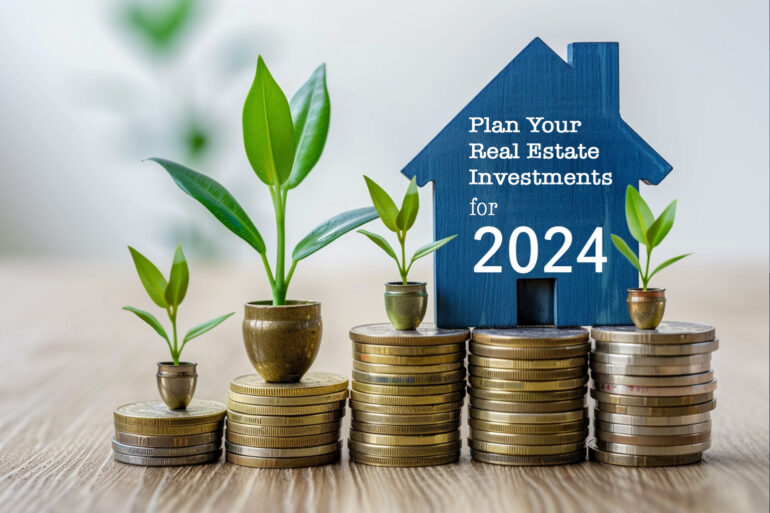How to Plan Your Real Estate Investments for 2024
It’s 2024. If you haven’t already, now’s the time to plan your investing strategy for the coming year. The U.S. real estate market is in a unique position. Home sales are down, prices are high, and mortgage rates are up. Can real estate still be a good investment?
The short answer is yes, but you must follow a robust investing strategy. Start here:
With a clear goal in mind, understand current trends that could impact your investment strategy in 2024.
1. Set real estate investing goals
Before you buy your next investment property, set clear goals about what you want to accomplish. Are you looking for long-term value appreciation, monthly cash flow, or a quick profit? Your answer to these questions will likely change your investing approach.
Also, consider your investment time horizon. If you’re nearing retirement, you may have a lower risk tolerance than someone who’s young and just starting their career. Consequently, the type of real estate deals you’re willing to enter may be different.
Whatever you do, ensure your investment goals follow the SMART framework. This means they should be specific, measurable, achievable, relevant, and time-bound.
An example of a SMART real estate investing goal could be accruing a portfolio of thirty cash-flowing long-term rental units by the time you retire at the age of 65.
The key to success is to manage risk, stay accountable, and track your progress.
2. Understand current U.S. market trends
With a clear goal in mind, understand current trends that could impact your investment strategy in 2024. Here’s a brief breakdown of the U.S. real estate market now:
The U.S. is experiencing a housing shortage. According to the National Association of Realtors (NAR), the monthly housing supply (the number of months it would take to sell all houses for sale at the current sales rate) is around 3 months. In January 2022, it hit a record low of just 1.6 months. A balanced market would be 5-6 months.
The lack of housing inventory has kept home prices high. In fact, home prices have been rising for seven months straight. In Q3 2023, the median home sold for $431,000.
Part of what’s keeping home supply down and prices high is the rapid rise of mortgage rates. Ever since the Federal Reserve started hiking its key interest rate last spring, mortgage rates have risen, deterring many homeowners from selling and giving up their locked-in low rates. As of November 17, the average 30-year fixed mortgage rate is 7.44%, down from its recent 8% peak but up from an all-time low of 2.6% in 2020.
This “lock-in effect” on current homeowners has constrained existing home supply and kept home prices high (despite higher mortgage rates also dampening buyer demand).
Consequently, real estate transactions are down. In September, existing home sales fell to a seasonally adjusted annual rate of 3.96 million, the lowest it’s been since 2010.
As a real estate investor, these trends mean finding property deals can be challenging and may require getting creative.
Every real estate investment involves risk.
3. Follow an investing strategy
Knowing the state of the real estate market, you can start forming an investing strategy.
For example, given the low supply and high prices of homes for sale, you may want to focus on off-market opportunities. Tax deed and foreclosure properties can be great options because they’re usually not listed on sites, like Zillow, or even the multiple listing service (MLS). So, you may face less competition and find hidden gems. In September, foreclosure filings were up 8% from August and 15% from September last year.
Other real estate investing strategies you can explore include house hacking, flipping, wholesaling, the BRRRR strategy, and more.
The key to success is to manage risk, stay accountable, and track your progress. The famous Peter Drucker once said, “You can’t improve what you don’t measure.” So, keep careful records of your expenses and revenue to maximize your return on investment.
4. Research locations and properties
“Location, location, location” is the number one rule of real estate. It means no matter how nice a property is or what condition it’s in, its value will always be tied to where it is.
This is because more people want to live where there are more job opportunities, attractive amenities, good infrastructure, and nice weather. As demand for an area goes up, so does the value of its real estate (and vice versa).
As an investor, you can capitalize on the increasing buyer demand in attractive markets. For example, Florida was the fastest-growing U.S. state in 2022 for the first time since 1957. Its population grew by 1.9% to over 22 million. If the state’s population growth continues to outpace that of other states, an investment property here could yield a relatively strong appreciation in value. An influx of residents could also keep rental demand high, leading to low vacancy rates and higher cash flow.
To stay on top of the most profitable real estate markets, keep a close eye on demographic and economic trends nationwide.
Timing the real estate market is impossible. But savvy investors know how to adapt to changing conditions to win in any market.
5. Plan exit strategies
Every real estate investment involves risk. A tenant could stop paying rent, a natural disaster could damage your property, or local home values could drop.
One risk that many first-time investors fail to consider is getting stuck with an underperforming property. Some deals just don’t work out the way you hope, and it may not even be your fault. But being unable to get out of a bad deal makes a bad situation even worse. It means losing money indefinitely.
Consequently, your investment plan needs to have an exit strategy — or better yet, multiple exit strategies. That way, you can cut your losses sooner rather than later. Some common exit strategies to consider include the following:
- Sell. This is the most obvious way to get out of a real estate deal. But remember that real estate is relatively illiquid, meaning it’s a slow transaction and it’s not always easy to find a willing buyer who’ll pay your asking price.
- Refinance. Though not a hard exit, refinancing may let you lock in a better deal on the property’s mortgage. For example, you may be able to refinance at a lower interest rate to reduce the final cost of the loan.
- Conduct a 1031 exchange. This lets you defer paying capital gains tax on a property sale by putting the sale proceeds toward another similar property of equal or greater value. That way, you’re left with more money to reinvest. Do multiple 1031 exchanges in a row to put off capital gains taxes indefinitely.
- Bring on another investor. To reduce your risk exposure to a property deal, consider selling a portion of it to another investor. You’ll give up some of the potential profits, but you’ll also hedge your bets if things go south.
The bottom line
Timing the real estate market is impossible. But savvy investors know how to adapt to changing conditions to win in any market. If you’re considering getting into real estate, start by building a strong investing strategy now by following the steps above.
And if you’re interested in Florida foreclosure or tax deed deals, check out https://propertyonion.com/property search map.








